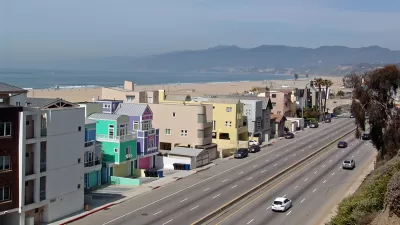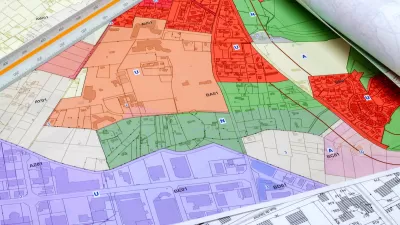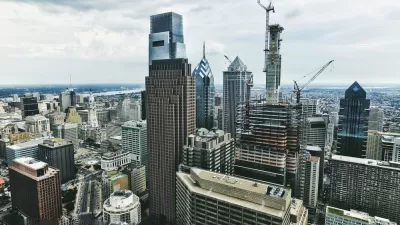Many local leaders spoke strongly against President Trump's decision to withdraw the United States from the Paris Climate Accords, but local land use and transportation policies still sorely lack any consideration of climate impact.

Juan Matute writes of the example set by the liberal enclave of Santa Monica, California in the effort to limit carbon emissions. Matute's verdict: that the city of Santa Monica, like the United States, is backing off commitments to address climate change.
First, Matute notes Santa Monica's tradition of environmental planning, and its ostensible commitment to the cause of limiting carbon emissions:
Santa Monica has a long-standing Sustainable City Plan and a Sustainability Bill of Rights (which enumerates a resident’s right to a sustainable climate). It would seem that a city like Santa Monica would make every effort to consider the impacts of its major decisions on our planet’s future climate.
But the city has recently released a new downtown plan "that ignores its impact on climate change," writes Matute. Instead of planning for new growth around the city's transit lines, Matute says the plan makes a few token mentions of the city's carbon footprint, and a few sentences devoted to the California's SB 32, passed last year, which mandates a 40 percent reduction in statewide GHG emissions.
Matute recommends the use of the Integrated Transportation and Land Use Consequential Life-Cycle Assessment method to model emissions resulting from planning decisions. It will be up to planning agencies at the local level to decide to consider and address those kinds of models. To be fair—Santa Monica is not the only liberal-leaning city that hasn't.
FULL STORY: An Inconvenient Truth: Climate Change Takes A Backseat to Slow Growth in Santa Monica’s Downtown Plan

Planetizen Federal Action Tracker
A weekly monitor of how Trump’s orders and actions are impacting planners and planning in America.

Congressman Proposes Bill to Rename DC Metro “Trump Train”
The Make Autorail Great Again Act would withhold federal funding to the system until the Washington Metropolitan Area Transit Authority (WMATA), rebrands as the Washington Metropolitan Authority for Greater Access (WMAGA).

The Simple Legislative Tool Transforming Vacant Downtowns
In California, Michigan and Georgia, an easy win is bringing dollars — and delight — back to city centers.

The States Losing Rural Delivery Rooms at an Alarming Pace
In some states, as few as 9% of rural hospitals still deliver babies. As a result, rising pre-term births, no adequate pre-term care and "harrowing" close calls are a growing reality.

The Small South Asian Republic Going all in on EVs
Thanks to one simple policy change less than five years ago, 65% of new cars in this Himalayan country are now electric.

DC Backpedals on Bike Lane Protection, Swaps Barriers for Paint
Citing aesthetic concerns, the city is removing the concrete barriers and flexposts that once separated Arizona Avenue cyclists from motor vehicles.
Urban Design for Planners 1: Software Tools
This six-course series explores essential urban design concepts using open source software and equips planners with the tools they need to participate fully in the urban design process.
Planning for Universal Design
Learn the tools for implementing Universal Design in planning regulations.
Smith Gee Studio
City of Charlotte
City of Camden Redevelopment Agency
City of Astoria
Transportation Research & Education Center (TREC) at Portland State University
US High Speed Rail Association
City of Camden Redevelopment Agency
Municipality of Princeton (NJ)





























